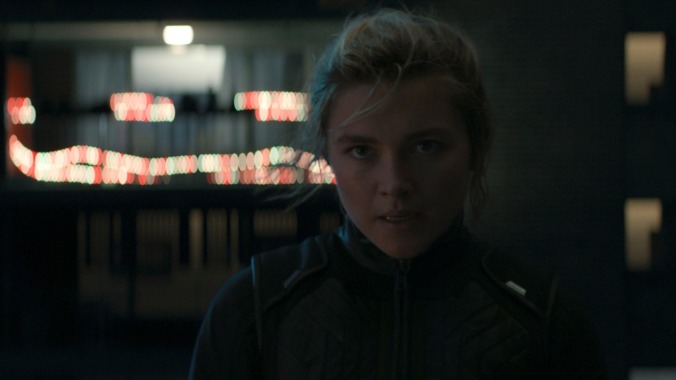This week’s Hawkeye served Yelena Belova a lot better than the end of the Black Widow movie
Now that it's tied to characters we know and care about, Yelena's desire to avenge her sister's death makes more sense

Note: This post discusses plot points from “Ronin,” the fifth episode of Hawkeye.
Hawkeye writer Jonathan Igla recently revealed that he came up with the idea to include Florence Pugh’s Black Widow character Yelena Belova (the younger sister of Scarlett Johansson’s Natasha Romanoff) in the Disney+ series, which led Marvel Studios boss Kevin Feige to go to the Black Widow team and tell them to add a post-credits scene that sets up a reason for Yelena to go up against Jeremy Renner’s Clint Barton, without informing them why.
The Black Widow stinger was somewhat awkward, even at the time, at least partially because we still don’t really know anything about Contessa Valentina Allegra de Fontaine (Julia Louis-Dreyfus), the woman who pointed Yelena in Clint’s direction by telling her that he’s the reason Natasha died. But there was a nice payoff in the fourth episode of Hawkeye, when Yelena showed up to try and take out everyone’s most-tolerated Avenger.
That is, it was a nice payoff until “Ronin,” Hawkeye’s fifth episode, effectively rewrote Black Widow’s post-credits scene—and did it significantly better, at that. The Marvel Cinematic Universe movies, especially early on, had a funny streak of post-credits scenes that came across as deeply important at the time but get overwritten by subsequent movies, like Tony Stark talking to General Ross in The Incredible Hulk or Loki possessing Dr. Selvig in Thor to get the Tesseract.
Neither of those scenes make sense after The Avengers, and now Hawkeye has mostly done the same to Black Widow, with a cold open that serves as a much more interesting take on a Black Widow post-credits scene. In a sequence set in 2018, Yelena and another former Black Widow assassin sneak into a fancy mansion in hopes of rescuing one of their brainwashed colleagues (as seen in Black Widow).
When it’s revealed the operative isn’t brainwashed at all, the three former assassins sit down and have a fun, breezy chat about the possibility of living a normal life. At this point, every MCU fan should know what to expect: Just like with Hawkeye’s family in the beginning of Avengers: Endgame, somebody’s going to get Thanos-snapped out of existence. It turns out to be Yelena herself who turns to dust; but in a clever twist we haven’t seen in the MCU yet, she immediately snaps back as the world around her shifts, and she catches up to the fact that it’s now five years later and the Avengers have saved the world. More important to Yelena, though, is that her sister is now dead.
Unlike the Black Widow stinger, where the Contessa basically says, “She’s dead and here’s a photo of the guy who did it,” the Hawkeye cold open makes room for the important nuance of Natasha’s death in Endgame: It was her choice, and Hawkeye did what he could to stop it from happening. Sure, it’s technically his fault, but it’s only his fault because Avengers: Infinity War established that you have to make a sacrifice to get the Soul Stone and her death was more of a sacrifice than his would’ve been.
Without knowing the Contessa’s motivations, or who she’s working for, or anything about her (even after her appearance in The Falcon And The Winter Soldier), her suggestion that Clint killed Natasha just rings hollow, and invites pedantic nerdery like what we went over in the previous paragraph. In stark contrast, when Yelena talks to Kate Bishop in this week’s Hawkeye episode and explains to her that Clint isn’t the hero she thinks he is, it feels more legitimate because it’s coming from an emotional place. The facts of her sister’s death don’t matter to Yelena, just that she and Clint went to that planet together and only he came back.
“Ronin” also handles the story beat of who pointed Yelena in Clint’s direction more skillfully than Black Widow. Here, Yelena actually looks into who hired her, after Kate Bishop points out that anyone who would pay an assassin to kill an Avenger—no matter what personal grudge Yelena has against Hawkeye—can’t possibly be a good person. The episode ends with the reveal that it was Eleanor Bishop, Kate’s mother, who hired Yelena to kill her daughter’s superhero idol (and new best friend) at the behest of none other than the oft-teased “man at the top” of organized crime in New York City. The… Kingpin, as they say.
There’s no mention of the Contessa whatsoever, and even if we accept that Yelena knew her sister was dead but didn’t know how or why until the Contessa told her in the Black Widow stinger, this more effective reveal—which involves characters we actually know—renders that scene irrelevant. Pair it with the emotional punch of seeing Yelena come back from the snap and realizing Natasha is dead, and suddenly her motivations for wanting to kill Hawkeye are much more interesting than before. Hell, finally getting confirmation that Kate’s mom is involved in whatever the bad guys are doing—and that she’s working for one of the biggest bad guys in the Marvel universe—makes Hawkeye itself even more intriguing than before.